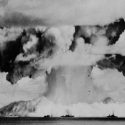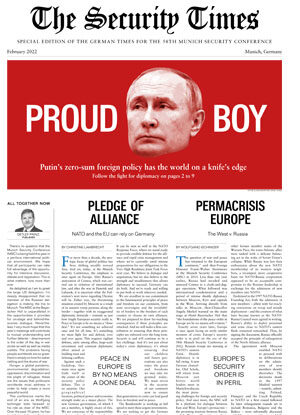Permacrisis Europe
The West V. Russia.
“The question of war and peace has returned to the European continent,” said then-Foreign Minister Frank-Walter Steinmeier at the Munich Security Conference (MSC) in 2015. Less than one year earlier, Russia had invaded and annexed Crimea in a cloak-and-dagger operation. What followed was international condemnation and a period of intense shuttle diplomacy between Moscow, Kyiv and capitals in the West. Arriving directly from talks in Moscow, then-Chancellor Angela Merkel warned on the main stage at Hotel Bayerischer Hof that “the foundations of the peace order in Europe are by no means self-evident.”
Exactly seven years later, Europe is once again facing an eerily similar moment of crisis: Europe’s security order is in peril on the eve of the 58th Munich Security Conference in 2022. Russian troops are massing at NATO’s eastern flank. Shuttle diplomacy is in full swing. A new German chancellor, Olaf Scholz, will return from Moscow just before world leaders meet in Munich to discuss the most pressing challenges for foreign and security policy. And once more, the MSC will be a platform for dialogue between East and West. Europe’s permacrisis – the persisting tensions between Russia and the West – will continue to shape the debates on Europe’s security for years to come. The tasks before Europe are momentous.
One thing is certain: In retrospect, Russia bears great responsibility for why its relations with the West have reached a new nadir. Yet, before NATO-Russia relations soured to the worrying low point we witness today, there were signs that a more cooperative age of security in Europe was in the cards.
Faced with the NATO membership aspirations of Poland, Hungary and other former member states of the Warsaw Pact, the trans-Atlantic allies were tasked with a delicate balancing act in the wake of Soviet Union’s collapse. While Russia was less than enthusiastic about the new NATO membership of its western neighbors, a revamped, more cooperative basis for NATO-Russia cooperation appeared to be an acceptable compromise to the Russian leadership in exchange for the admission of new members into NATO.
Enshrined in the 1997 NATO-Russia Founding Act, both the admission of new members – albeit with far-reaching restrictions on troop and missile deployment – and the creation of what later became known as the NATO-Russia Council were agreed in writing. Russia’s ability to deploy personnel and arms close to NATO’s eastern flank remained untouched. Thus, by signing the document, Russia officially accepted the principle of enlargement of the North Atlantic alliance.
The agreement with Moscow enabled NATO to proceed with its deliberations on the admission of new members shortly thereafter. The decisions made at the 1997 Madrid summit – namely, admitting Poland, Hungary and the Czech Republic to NATO in a first round followed by later enlargement rounds set to include Romania, Bulgaria and the Baltics – were informally discussed with Moscow to avoid a renewed fallout. In hindsight, this was a masterpiece of responsible Ostpolitik with Berlin in the driver’s seat.
But relations went downhill from there. While Russia is without a doubt responsible for most of the lost trust in East-West relations, NATO, too, must acknowledge past mistakes. Starting with its 2007 Bucharest summit, an enlargement crisis began to weigh heavily on NATO-Russia relations. The Alliance greenlit a compromise formula for the accession of Ukraine and Georgia, stating that “these countries will become members of NATO.” The Kremlin regarded this as a prospectus for former Soviet territories to gain NATO membership.
What followed is the well-documented Russia-Georgia confrontation, the separation of Abkhazia and South Ossetia from Georgia as well as Russia’s annexation of Crimea in 2014 and its subsequent active support of separatist groups in Ukraine’s Donbass region.
How to turn the tide? Today’s lack of mutual trust reinforces a profound crisis of Europe’s security order. The task of reconciling Russian requests with NATO’s room for compromise is a challenging one at best – and an impossible one at worst. The proposal now presented by Russia for a permanent and explicit rejection of Ukrainian NATO accession goes far beyond earlier Russian demands and runs counter to the established principles of Europe’s security architecture.
NATO’s reaction to Russia’s dangerous game should follow a tried and tested strategy, the dual-track approach combining deterrence and dialogue. While the West should spell out in no uncertain terms the immense costs of any Russian advances into Ukraine, NATO should not simply dismiss Russian proposals categorically; it should see them as the opening foray in a long and cumbersome diplomatic process, such as within the framework of the OSCE.
“If foreign policy is in high demand, it is seldom a good sign for the state of the world,” said German President Frank-Walter Steinmeier exactly seven years ago in his speech in Munich. As world leaders meet for the MSC 2022, foreign policy and diplomacy are indeed in high demand. Europe’s permacrisis requires more dialogue and more resolve to shake off the collective sense of helplessness in the face of Russia’s misconduct.
Wolfgang Ischinger is chair of the Munich Security Conference and professor
for international security and diplomatic practice at the Hertie School of Governance in Berlin.



